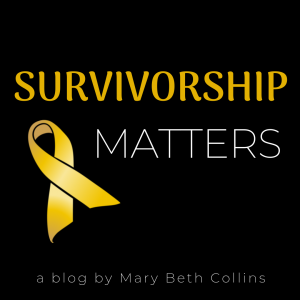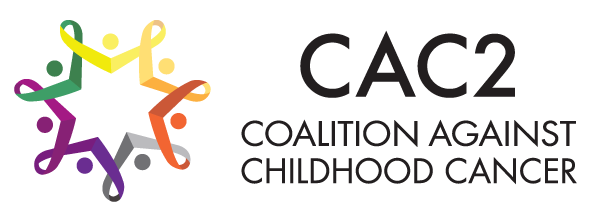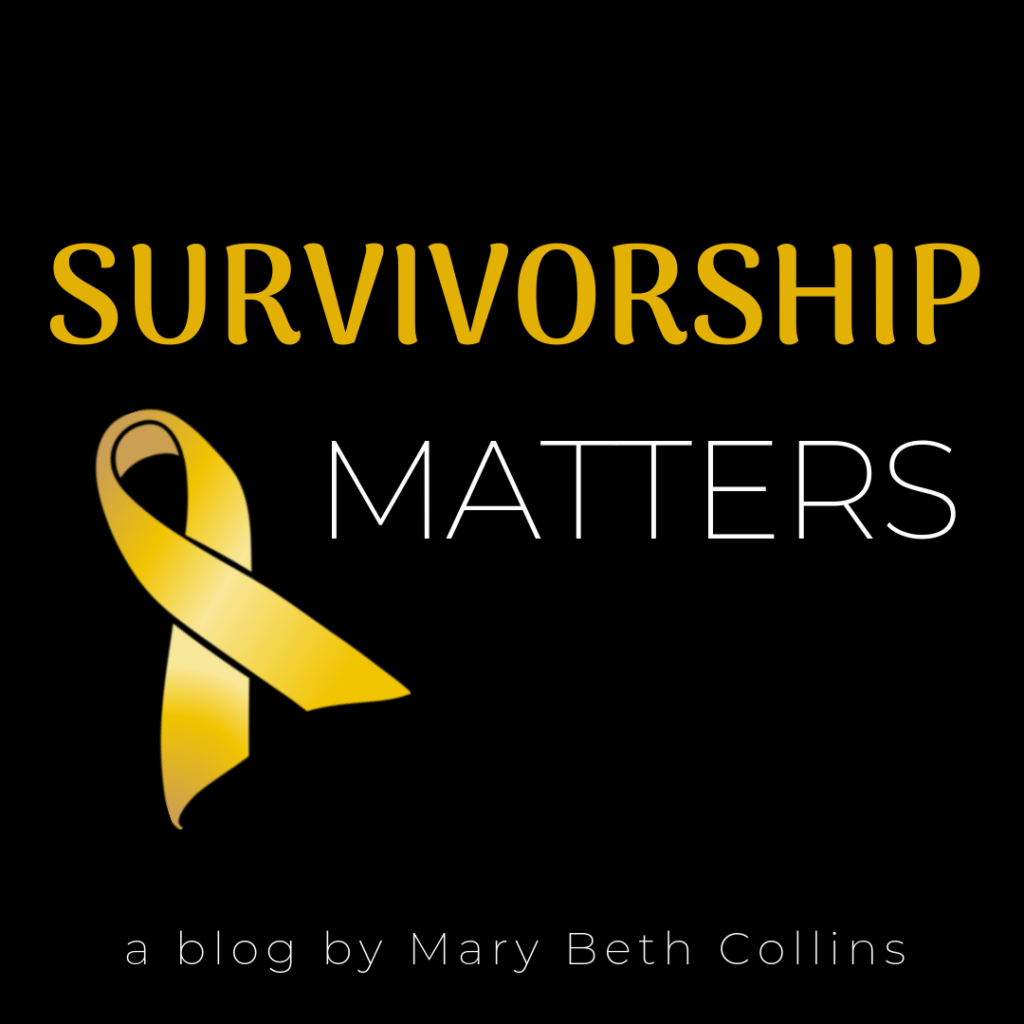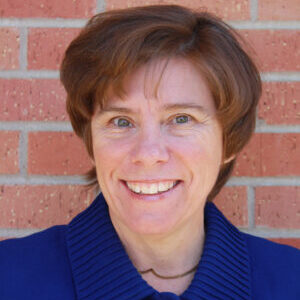 Survivorship Matters Blog By CAC2 Member Mary Beth Collins
Survivorship Matters Blog By CAC2 Member Mary Beth Collins
My introduction to childhood cancer and bullying was in 1999 on a neuroblastoma listserve with ACOR (American Cancer Online Resources), the way parents and specialists congregated together before the explosion of social media channels like Facebook, Twitter, or Instagram. My son had only been in treatment a few months, and a parent was sharing an incident that happened on the playground. Her son had been looking forward to getting well enough to return to school, and his fellow classmates decided at recess to taunt him by pretending to be afraid of his “cancer cooties.” He came home in tears. The idea pierced my heart like a sword. Unfortunately, the response from others in the group left me speechless. Other parents confided how their children too had been bullied. One of the worst was a fire drill where a child in treatment was in a wheelchair, and the school elevator was out of order, so the teacher just left the child at the stairs and said, “We’ll just have to leave you here. We’ll come back afterwards and get you.” Children whispered “Burn!”This is the part of childhood cancer that is almost too painful for adult to discuss. Many adults struggle to find the strength and words to even talk about children having cancer at all. It must be one of the worst nightmares that most parents can’t even fathom. But the idea that other children would literally add insult to injury by making fun, ridiculing, or even physically hurting other children already so sick is inconceivable. It is a display of human capacity that is almost impossible for most of us to believe to be true. Except that it is true. And countless children across the country are living each day with such bullying.
According to “A Systematic Review Summarizing the State of Evidence on Bullying in Childhood Cancer Patients/Survivors” published in the Journal of Pediatric Oncology Nursing 2019, Vol. 36 (1)55-68, the first systematic review to examine bullying in childhood cancer patients/survivors, researchers state “childhood cancer patients/survivors may experience elevated levels of bullying compared with the general population, particularly verbal bullying related to the physical side-effects of treatment.” And perhaps not surprisingly, the self-report rates were considerably higher than data gathered by parents and teachers. Despite numerous health concerns, the response to bullying by childhood cancer patients/survivors is similar to the general population and often not reported because they feel ashamed or perceive that parental involvement could make the situation worse. Researchers admitted that “alternatively, it may be that parents are less attuned to social challenges, as their priority is the surviving child’s physical health.”
On April 30, CAC2 (Coalition Against Childhood Cancer) released its first-ever Public Service Announcement drawing attention to childhood cancer and bullying with a grounding statement: “Nationwide, children with cancer are 60% more likely to be bullied than their healthy classmates. CAC2 is committed to supporting those who have been hurt or harmed, to treating others with kindness, to accepting people’s differences, and to helping include those who are left out. The PSA is now live, here: https://youtu.be/02JmpJwxNLI. Please be aware that the piece has strong emotional content.”
As a parent of a 20-year-old survivor, and proud member of CAC2, I was taken aback by this release. Bullying isn’t something parents share often at advocacy events or childhood cancer conferences. I probably had only discussed our experiences a few times over the years, and only happenstance if it was with a fellow cancer family. I wasn’t aware of the prevalence. The stigma of bullying victimization leaves children and their parents isolated, alone, and in pain. But children surviving cancer already endure so much, and too much of it is isolated, alone and in pain. CAC2 should be applauded for such courage to spotlight this issue through its PSA, a website page devoted to the topic, and an invitation to take a stand against bullying: “In doing so, we commit to supporting those who have been hurt or harmed, or treating others with kindness, to accepting people’s differences, and helping include those who are left out.” It reaches the sensitive spot of our humanity that screams at the same time “of course they shouldn’t be alone” with “how can other humans do that to these sick children?”
With my survivor now 22 years old, I felt great responsibility to respond to this call to action. The PSA was hard to watch, hearing a laughing track while sharing images of children in treatment compels one to tears. The human heart struggles with such conflict; it makes the viewer uneasy. And that is the point, as bullying these children battling the #1 disease killer of our kids defies all logic and reason. So, while it is awkward and unbelievable for adults, it is our children who are subjected to it.
Bullying is a difficult topic to discuss for parents dealing with childhood cancer. Families are already struggling with so much – supporting a child in treatment or contending with side effects in survivorship, as well as the emotional toll caretaking brings and financial drain on the family – that to find the strength to admit it is happening, let along address the bullying, is almost impossible. With my son now out of public school for a number of years, I felt great responsibility to speak about this collective truth, to lend my voice to this important declaration, and to share with the world that we were part of the 60% of children that had been bullied. Parents struggling in silence need to hear they are not alone. And even more importantly, they need to see that it doesn’t last forever, that our children who are struggling to survive so much can in fact survive the bullying as well.
This is a hard blog to write, because putting words to such pain isn’t easy. But it is easier for me to talk about past experiences than for the families dealing with it today to speak about current ones. My son encountered some incredibly difficult situations over the years. In 2009, my son wrote a narrative that was read in a congressional briefing entitled: “How Cancer Has Affected Me.” In the first paragraph, he remarked, “I’m thinking the only good thing about scars is that when somebody thinks that I’m lying about having cancer I have proof with me until I die.” Elementary school classmates accused him of lying about his cancer experience, to the degree he even lifted up his shirt in an attempt to expose his torso of scars as evidence that he wasn’t lying. One child had the nerve to accuse him of doing all of that damage to himself just to fool everyone. In middle school, a group of bullies would insult him regularly and even take things from him saying “You’re just going to relapse and die anyway. It’s not like you really need it.” These words are so cutting and mean, it is impossible to fathom that they were spoken by someone who was only 12 years old. But unfortunately, some of this behavior is led by adults who should know better and model disrespect for those dealing with childhood cancer and its affects. Much like the teacher who left a child in a wheelchair at the bottom of a stairwell during a fire drill, Josh’s soccer team was led by parents who cared so much about winning that he was the easy target to blame for lost games. He tolerated the comments until a the team lost a match where Josh only played ten minutes. Some adults, followed by teammates, criticized those ten minutes and Josh’s supposed incompetence as the reason they didn’t win. Teary-eyed he quit the team, giving up on a sport he had loved for eight years despite being a very capable fullback.
As a parent of a child with cancer, watching these kinds of episodes brings about a pain that is almost impossible to put into words. It is a pain that I admittingly packaged up and stored deep in the crevices of my mind and heart. Watching the #NotFunny PSA unwrapping emotion I was unequipped to process when the bullying was happening. Parents of childhood cancer learn early, and are forced to accept, that we cannot protect our children from pain, disease, and even death. But when your child is bullied, there is an immense cry deep in your soul screaming that the world needs to be kinder to your child. It is an emotional begging to the Gods to stop the pain inflicted on your precious one, that your child simply cannot survive anything further. The reasoning falls upon deaf ears, for there is no one to hear a parent’s plea to make life easier for a child who has already endured so much. I have shed many silent tears over the years in acceptance that regardless of my yearning, I was powerless of all that was happening to my son.
In middle school, when the band of bullies mocked the reality that Josh might relapse and die, my son needed to become empowered. I needed him to believe that the life recaptured from neuroblastoma was not to be subjected to bullying. We spoke to the assistant principle of the school, who eventually provided Josh with a “hot ticket” used as an immediate approval to leave any room in the school by showing it to any adult in the room or hallway, and go to the office. He only used it once. By the end of week, I found it in his bedroom trashcan. I was shocked and questioned him about it. “Mom, I don’t need it anymore. They don’t scare me, and they won’t take anything more from me. I’m OK.” That was ten years ago, and he was right. My son needed to see someone fight for him, so he could find the strength to fight for himself. And he’s never had an issue with bullying again, because he decided he would no longer be a victim. Even more surprising was his appreciation for understanding the causes of two of the bullies’ behaviors, and eventually befriended them and helping them with some of their own issues. Teachers shared with me this level of compassion is not something they see often, but speaks to the strength, confidence, and character of my son. As is said often, children with cancer seem to be old souls in young bodies, with wisdom far beyond their years.
An important thing to understand is that bullying, and the unresolvable stress that it often brings, has greater impact for a child in cancer treatment or contending with lifelong side effects. In the systematic review, researchers commented that “the negative response from peers may be particularly punishing for patients/survivors because of the contrast with the nurturing environment manifest in many pediatric hospital settings.” After receiving so much care and support from professionals and family in such an insular setting, the bullying feels exceptionally abrasive. And because it typically isn’t an isolated incident, the stress is maintained because of the regularity of the episodes or the hypervigilant state in anticipation of the next time the bullying will occur. Caring adults – whether parents, teachers, coaches, scout leaders, etc – may not realize that without intervention, this stress can exasperate significant health issues for vulnerable little bodies. Articles published regularly cite the impact of stress on the body, and how often it is a trigger for many chronic health issues. This alone is enough for concern for children struggling with a wide variety of health issues. But in a world that is only beginning to make available the appropriate psychosocial supports to comply with The Standards of Psychosocial Care for Children with Cancer and Their Families (to learn more, watch the CAC2 webinar “Psychosocial care for children with cancer and their families” ) the psychological impact on children living with and surviving cancer has the potential for lifelong impact. The systematic review states “bullying in childhood cancer patients/survivors warrants urgent attention,” noting that “bullying can lead to school phobia and absenteeism undermined by school and hospital personnel to address the myriad of academic, social and emotional challenges that can present when children with cancer return to school.” Around the same time CAC2 released its PSA, Lancaster University published an article detailing lifelong impact on students in secondary school: “School bullying increases chances of mental health issues and unemployment in later life.” Co-author Emma Gorman shares, “ “Our research shows that being bullied has negative impact on important long-term outcomes, especially unemployment, income and ill-health.” For children already vulnerable to such challenges in survivorship, the exponential impact of the bullying is probably vast. It emphasizes the need to expediate the creation of psychosocial support for childhood cancer patients, survivors and their families, for the improvement in quality of life for children throughout the lifespan.
There are great resources available today on the topic of bullying. StopBullying.gov is a comprehensive website providing a great deal of information for families detailing what it is, what to do about it, and how to prevent it. But interestingly enough, on its special needs page. it doesn’t even reference children with cancer. Websites like Stomp Out Bullying provide key information about the underlying causes of bullying, and the function it serves for those who bully. If we truly wish to eradicate bullying, we must respond with greater protection and empowerment for its victims as well as services for those who bully. But we have to speak of it, before people can address it. Thanks to CAC2, and this advocacy effort recently released, for the first time families can hear that bullying does in fact happen to children with cancer. One of most empowering sentences a person can mutter is “Me too,” and to families who find themselves saying just that when watching the #FunnyCancer PSA, please hear the very caring and mindful message that you are not alone and there is help.
Mary Beth Collins, author of the blog #SurvivorshipMatters, is a parent advocate with a son who was diagnosed with neuroblastoma in 1999 and juggling a number of chronic side effects from treatment. For 20 years she has advocated for childhood cancer issues, focused more recently on issues related to survivorship.



